Eco-conscious historical sites in Greece, such as the Acropolis, Delphi, and Olympia, face challenges in balancing preservation with tourism impact. This article explores their sustainability efforts, the influence of visitor behaviors, and the educational opportunities available. By implementing responsible practices and engaging the public, these sites aim to protect their cultural significance while fostering environmental awareness.
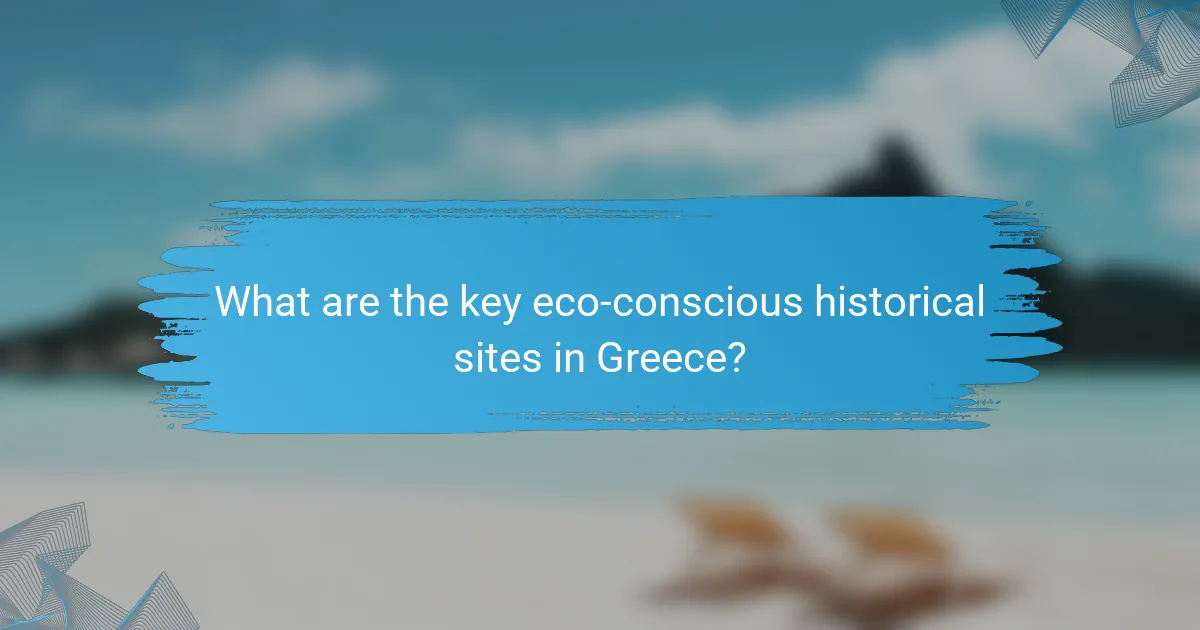
What are the key eco-conscious historical sites in Greece?
Key eco-conscious historical sites in Greece include the Acropolis, Delphi, and Olympia, which prioritize sustainability and education. These sites implement preservation efforts to maintain their cultural significance while minimizing visitor impact. The Acropolis, for example, has undergone extensive restoration and employs eco-friendly practices. Delphi promotes environmental awareness through educational programs. Olympia offers insights into ancient sports while advocating for ecological preservation. These efforts enhance visitor experiences and foster a deeper understanding of Greece’s rich heritage.
How do these sites contribute to environmental preservation?
Eco-conscious historical sites in Greece significantly contribute to environmental preservation by promoting sustainable tourism practices. These sites implement conservation strategies that protect local ecosystems while educating visitors about environmental stewardship. For instance, many sites engage in restoration projects, using local materials and traditional methods to minimize ecological impact. Additionally, visitor programs often emphasize the importance of preserving both cultural heritage and natural surroundings, fostering a deeper connection to the environment. As a result, these initiatives not only safeguard Greece’s historical treasures but also enhance awareness of environmental issues among tourists.
Which attributes define their eco-conscious efforts?
Eco-conscious efforts at historical sites in Greece are defined by sustainable preservation practices, community engagement, and educational initiatives. These attributes ensure the protection of cultural heritage while minimizing environmental impact.
Sustainable preservation practices include the use of eco-friendly materials and techniques in restoration. Community engagement fosters local involvement in conservation efforts, enhancing awareness and support. Educational initiatives provide visitors with information on the significance of preserving these sites, promoting eco-conscious tourism.
Unique attributes of these efforts include site-specific strategies tailored to local ecosystems. Rare attributes may involve partnerships with environmental organizations to enhance sustainability measures. Overall, these attributes reflect a commitment to balancing heritage preservation with ecological responsibility.
What role do local communities play in site preservation?
Local communities play a crucial role in site preservation by fostering stewardship and promoting sustainable practices. Their involvement ensures that historical sites remain culturally relevant and financially supported. Community-led initiatives often include educational programs that raise awareness about the importance of preservation. Additionally, local insights help tailor conservation efforts to specific site needs, enhancing overall effectiveness. Engaging residents creates a sense of ownership, which is vital for long-term preservation success.
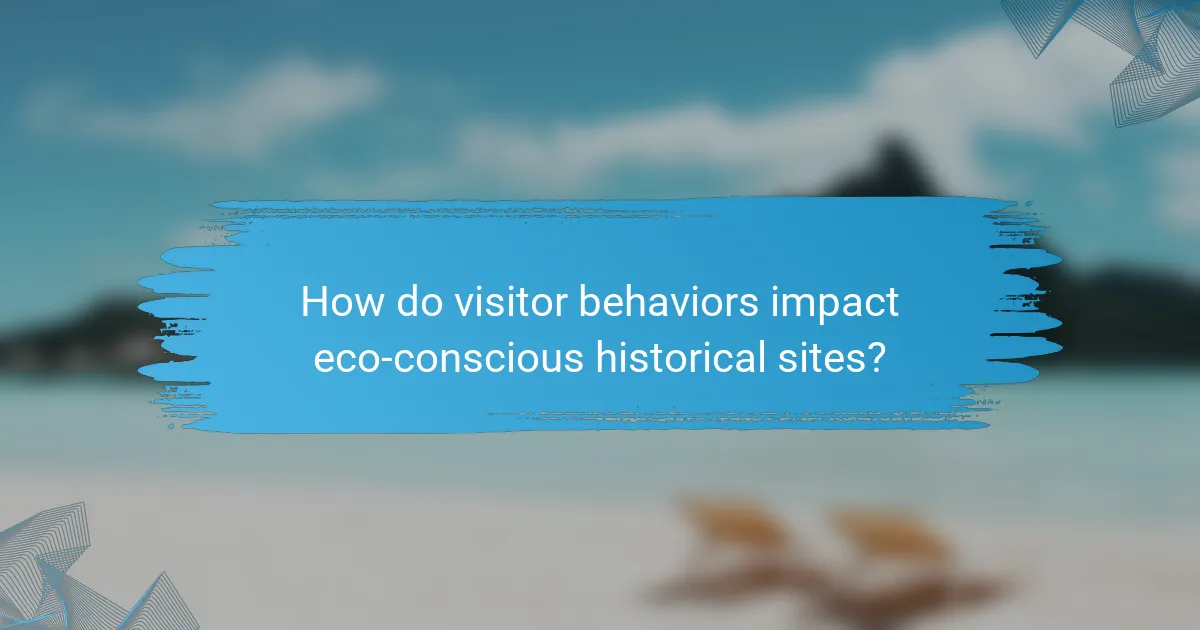
How do visitor behaviors impact eco-conscious historical sites?
Visitor behaviors significantly impact eco-conscious historical sites by influencing preservation efforts and educational opportunities. High foot traffic can lead to environmental degradation, prompting site managers to implement stricter conservation measures. Conversely, responsible visitor actions, such as following guidelines and participating in educational programs, can enhance sustainability initiatives. For example, in Greece, sites like the Acropolis have adopted visitor management strategies to mitigate wear and promote eco-friendly practices. Engaging visitors in conservation efforts fosters a sense of responsibility, ensuring the longevity of these cultural treasures.
What are the effects of tourism on site sustainability?
Tourism can significantly impact site sustainability, both positively and negatively. Increased visitor numbers can lead to resource depletion and environmental degradation at historical sites. However, responsible tourism practices can enhance preservation efforts and fund conservation initiatives. Educational opportunities also arise, fostering awareness and appreciation for these sites. Balancing visitor impact with sustainable practices is crucial for the longevity of eco-conscious historical sites in Greece.
How can visitors engage responsibly with these sites?
Visitors can engage responsibly with eco-conscious historical sites in Greece by following sustainable practices. Prioritize minimizing environmental impact through respectful behavior and adherence to site rules.
1. Respect local guidelines and regulations regarding access and behavior.
2. Use designated paths to protect natural surroundings and archaeological integrity.
3. Avoid littering and dispose of waste properly in designated bins.
4. Support local businesses and communities to promote sustainable tourism.
5. Participate in educational programs to enhance understanding of preservation efforts.
6. Share knowledge about the importance of conservation with others.
These actions contribute to the preservation of Greece’s cultural heritage while fostering a positive visitor experience.
What strategies are in place to mitigate negative visitor impacts?
Strategies to mitigate negative visitor impacts at eco-conscious historical sites in Greece include strict visitor limits, guided tours, and educational programs. Implementing these measures helps preserve the integrity of sites while enhancing visitor awareness of conservation. For example, limiting daily entries reduces wear and tear on structures. Guided tours provide context and minimize the risk of damage from unregulated exploration. Educational initiatives foster a sense of responsibility among visitors, encouraging them to respect the environment and cultural heritage.
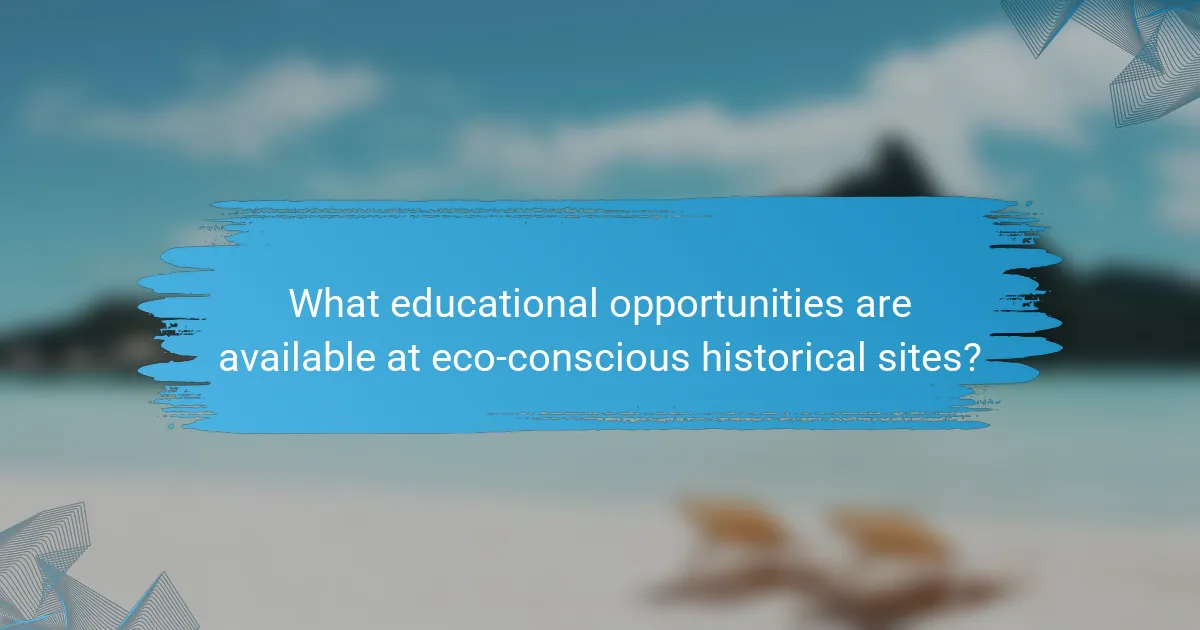
What educational opportunities are available at eco-conscious historical sites?
Eco-conscious historical sites in Greece offer various educational opportunities, including guided tours, workshops, and interactive exhibits. Visitors can learn about sustainable practices, conservation efforts, and the cultural significance of these sites. Programs often focus on the impact of tourism on preservation and the importance of eco-friendly initiatives. Many sites collaborate with local schools and organizations to enhance educational outreach, providing a unique learning experience that emphasizes environmental awareness and historical context.
Which programs promote environmental awareness among visitors?
Various programs promote environmental awareness at eco-conscious historical sites in Greece. These initiatives include guided tours emphasizing sustainability, workshops on local ecology, and community events focused on conservation.
For example, the Acropolis Museum offers educational programs highlighting the importance of preserving archaeological sites while minimizing ecological footprints. Additionally, the Ancient Agora hosts interactive sessions that engage visitors in discussions about sustainable tourism practices.
Such programs enhance visitor understanding of environmental impact and foster a sense of responsibility towards cultural heritage preservation.
How do these sites integrate local history and ecology in their educational offerings?
Eco-conscious historical sites in Greece integrate local history and ecology through immersive educational programs. These programs highlight the significance of preserving natural landscapes alongside cultural heritage. For instance, guided tours often emphasize sustainable practices and local biodiversity, fostering a deeper understanding of ecological interconnections. Additionally, workshops and community events encourage visitors to engage with historical narratives while promoting environmental stewardship. This dual focus enhances visitor experiences and supports conservation efforts, making education a vital component of site preservation.
What partnerships exist between historical sites and educational institutions?
Partnerships between historical sites and educational institutions enhance preservation and promote awareness. Educational programs often include workshops and guided tours, fostering a deeper understanding of eco-conscious practices. Collaborations may involve research initiatives, where students contribute to conservation efforts. These partnerships create opportunities for experiential learning, allowing students to engage directly with historical contexts while promoting sustainable tourism.
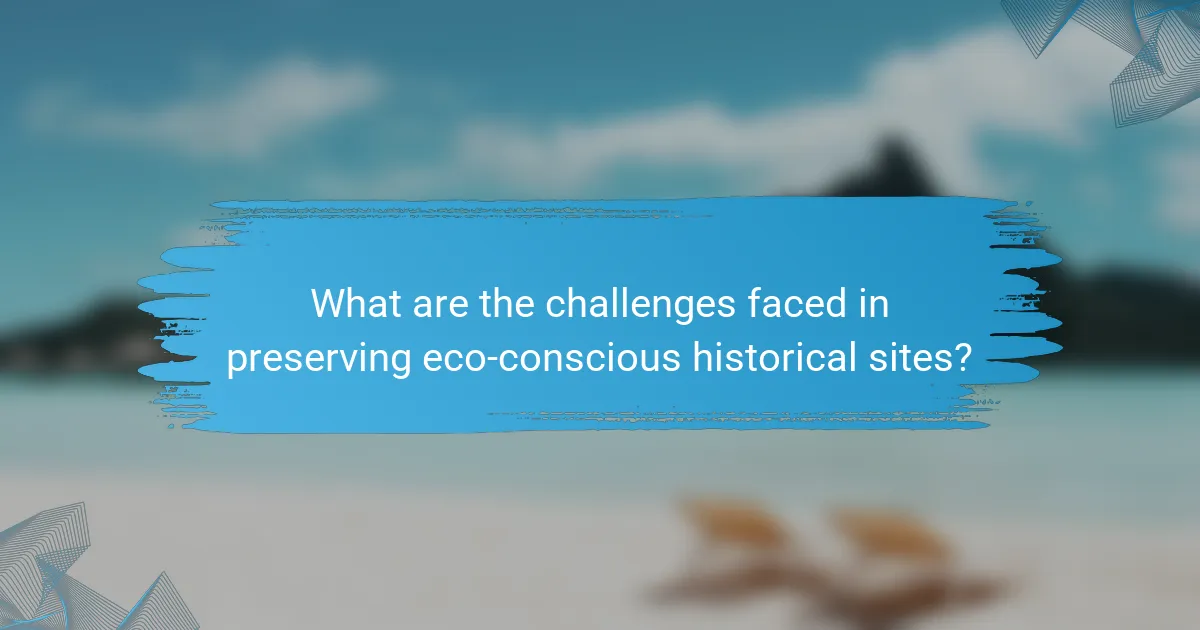
What are the challenges faced in preserving eco-conscious historical sites?
Preserving eco-conscious historical sites in Greece faces significant challenges. These include balancing tourism impact, funding limitations, and environmental degradation. Increased visitor numbers can lead to wear and tear on structures, necessitating sustainable management practices. Additionally, securing financial resources for preservation efforts often competes with other priorities. Environmental factors, such as climate change, further threaten these sites, requiring innovative solutions to mitigate damage.
How do funding and resources affect preservation efforts?
Funding and resources significantly impact preservation efforts for eco-conscious historical sites in Greece. Adequate financial support enables the implementation of restoration projects, maintenance, and sustainable tourism practices. For instance, government grants and private donations can facilitate the use of eco-friendly materials and technologies, enhancing site longevity. Limited funding often leads to neglect, threatening the structural integrity and cultural significance of these sites. Moreover, educational programs funded by resources can raise awareness among visitors, promoting responsible tourism and community engagement in preservation.
What legal frameworks support or hinder site preservation?
Legal frameworks can both support and hinder site preservation in Greece. The Greek Constitution emphasizes cultural heritage protection, promoting conservation efforts. However, bureaucratic processes and lack of funding can obstruct these initiatives. Additionally, EU regulations provide guidelines for sustainable tourism that impact site management positively. Local laws can vary, affecting preservation practices and visitor access.
Which rare attributes enhance the significance of certain sites?
Rare attributes that enhance the significance of eco-conscious historical sites in Greece include unique architectural styles, indigenous plant species, and exceptional preservation techniques. These attributes contribute to the educational value and visitor experience. For instance, sites like the Acropolis offer insights into ancient engineering, while lesser-known sites may showcase rare flora that is crucial for local ecosystems. Additionally, community-led preservation initiatives often reflect cultural heritage, making these sites more meaningful.
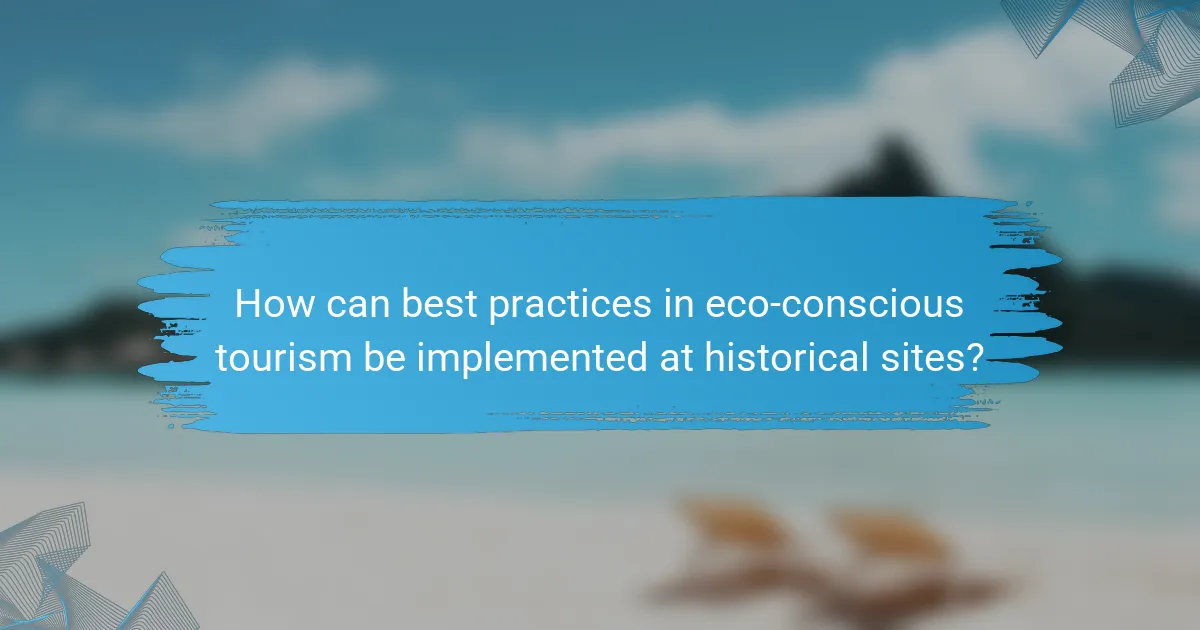
How can best practices in eco-conscious tourism be implemented at historical sites?
Best practices in eco-conscious tourism can be implemented at historical sites in Greece through sustainable management strategies. These include minimizing visitor impact, promoting local culture, and enhancing educational opportunities.
First, tourist facilities should adhere to sustainable practices, such as using renewable energy sources and minimizing waste. Second, local communities should be involved in decision-making processes to ensure their culture is respected and preserved. Third, educational programs can raise awareness about the significance of conservation and responsible tourism, fostering a deeper connection between visitors and historical sites.
Incorporating these practices not only preserves Greece’s rich heritage but also enhances visitor experiences while promoting environmental stewardship.
What expert tips can enhance visitor experience while promoting sustainability?
To enhance visitor experience while promoting sustainability at eco-conscious historical sites in Greece, implement the following expert tips.
1. Educate visitors on local conservation efforts through guided tours that emphasize the importance of preservation.
2. Encourage the use of digital resources for information instead of printed materials, reducing paper waste.
3. Promote responsible tourism practices, such as respecting site boundaries and minimizing environmental footprints.
4. Provide incentives for visitors who use sustainable transportation options, like biking or public transit, to reach the sites.
5. Collaborate with local communities to create authentic cultural experiences that support sustainable practices and local economies.
What common mistakes should visitors avoid when engaging with these sites?
Visitors should avoid several common mistakes when engaging with eco-conscious historical sites in Greece. First, do not touch or climb on ancient structures, as this can cause irreversible damage. Second, refrain from littering; always dispose of waste properly to protect the environment. Third, respect local customs and regulations, which often include guidelines on photography and noise levels. Lastly, be mindful of your group size; large crowds can overwhelm the site and hinder preservation efforts.